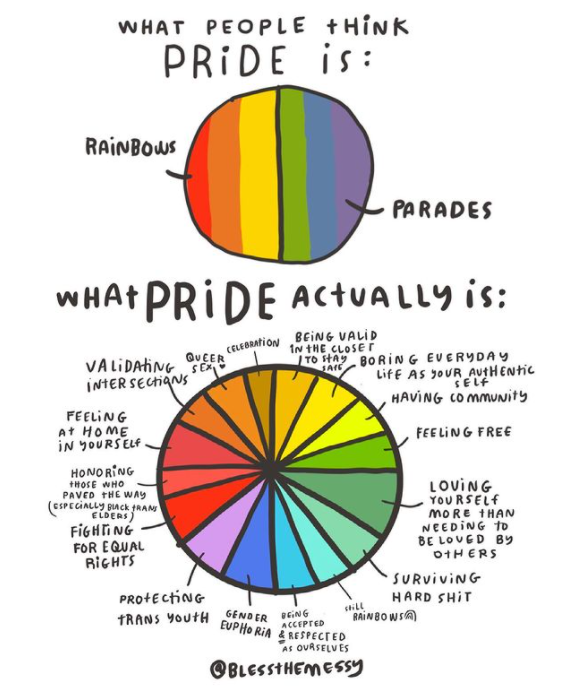Let's Celebrate Inclusive Research Beyond Pride Month
How can research and research participant communities become more inclusive of diverse voices? We talked to Dr. Karen Blair to find out!

An interview with Dr. Karen Blair, Ph. D
Pride month is a truly special time to celebrate inclusivity in all aspects of our lives. And while rainbows are wonderful, pride is much more than a parade.

To get a better understanding of how research is starting to become more inclusive of LGBTQ+ voices we talked to Dr. Karen Blair, the director of the Trent Social Relations, Attitudes and Diversity Lab in the Psychology Department at Trent University. She is an adjunct member of the Department of Psychology at Acadia University and an assistant professor professor at the University of Trent. Dr. Blair runs the KLB Research Lab which specializes in LGBTQ+ and relationship research.

Here are some of the findings that she shared with us about how we can continue to uplift diverse voices in research, specifically focused on relationships, beyond pride month.
What Researchers Are Doing
Same-Sex Research is Starting to Ask the Hard Questions
When asked about how research has become more inclusive during her career, Dr. Blair shared that in an effort to show that same-sex couples are worthy of the same rights as mixed-sex couples, research focused just on how same-sex couples are good. Researchers studying same-sex relationships wanted to show how “same-sex couples are just like mixed-sex couples,” she explained.
Researchers are starting to study challenges of same-sex couples too
In that effort, however, researchers were hesitant to conduct important research on the unique challenges that same-sex couples can face. Dr. Blair says that she is happy to see that “researchers are now a bit more daring and willing to do research that doesn’t always have a happy ending.” For example, researchers are more willing to do research on topics that highlight issues among same-sex couples too, such as researching intimate-partner violence in same-sex relationships.
Researchers Are Starting to Capture LGBTQ+ Measures
Dr. Blair explains that LGBTQ+ inclusion in research is very important because “in human research (where humans are the subject) we want to be able to make conclusions about how humans experience the world. In order for this to happen, we need to have the input be as diverse as possible.”
Researchers are more commonly capturing participant data regarding sexual and gender identity
One way that researchers are starting to be more inclusive in their research is to ask people about their sexual and gender orientations. Researchers are continually trying to refine the questions they ask you about your gender and sexual identity based on what their research is studying. They might even ask you multiple questions about your sexual preferences, identity, and orientation.
What You Can Do
Answer the Repetitive Questions
Have you ever participated in a research study and it feels like you get the same question 5 times? Like we mentioned above, researchers might ask you multiple questions about your gender and sexual identity but we promise there is a reason for that! Questions that are worded slightly differently might seem like ‘almost the same question’ to you but there may be someone who will answer 3 similarly worded questions differently.
Multiple measures help researchers collect the most trustworthy and reliable data
For example, a survey that asks you about your sexual identity, sexual orientation, and then who you’re attracted to might seem redundant to you but those answers might differ for someone else. Dr. Blair explains that having seemingly repetitive questions helps gather details that lead to “more reliable and trustworthy data”; just think, when researchers measure for depression, they use 20 different measures.
Know That You Are Making A Difference
Dr. Blair articulates, “one of the biggest misconceptions in science is that any given study is going to provide the answer to something.” This is not true. Research is often incremental, meaning that it may not seem like the 45 minute survey you are doing is going to help a scientist fix the issue of prejudice in the research community, but it will help them take small steps to do that.
Your data is part of a big puzzle and can help researchers solve big problems in the long-run
It seems like a cliche, but truthfully your response in a research study is a piece of a very big puzzle that can, together, help researchers learn about and hopefully solve big problems. Your voice in research matters and even if you can’t see the impact immediately, you are making a huge difference.
Honeybee is committed to supporting inclusive research related to relationships, all the way to gaming. Consider volunteering your time to the below studies as we carry forward the objective of inclusivity beyond pride month!
Honeybee
Connects the community with research. Honeybee is a web and mobile app to participate in research, discover yourself, and earn cash and rewards.

